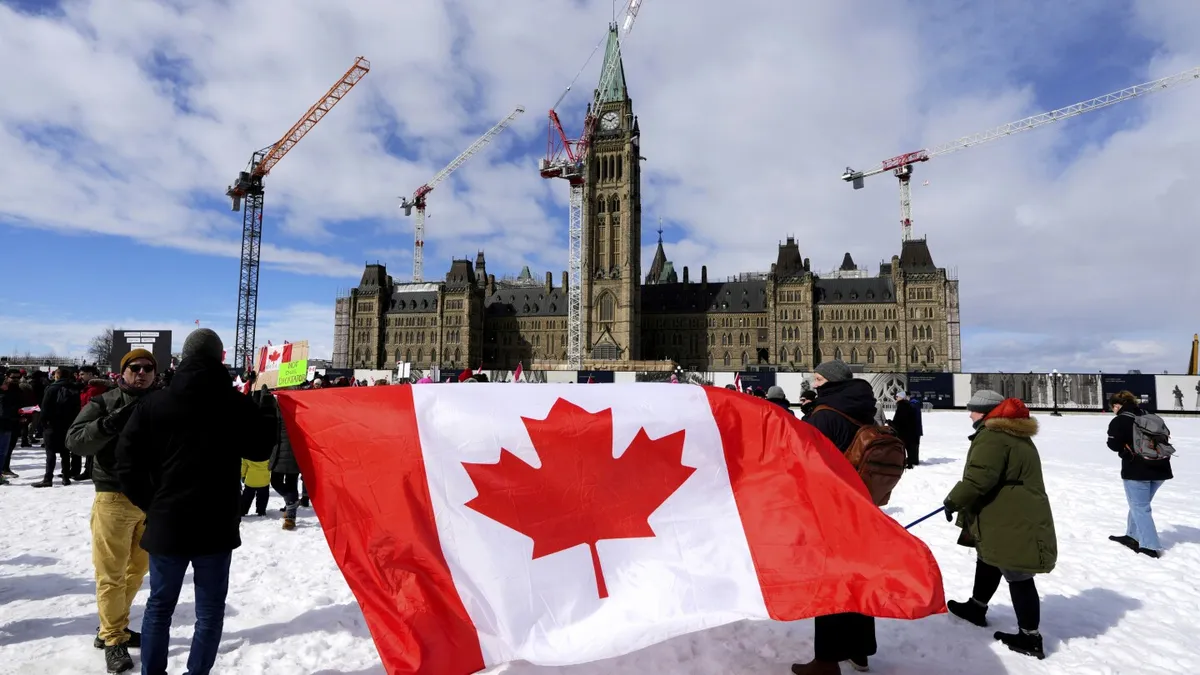
As Canadians prepare to head to the polls for a new government, Donald Trump has become an unexpected focal point in the electoral landscape. The U.S. president's ongoing trade war and provocative remarks suggesting that Canada could become the 51st state have sparked outrage among Canadians, leading to a surge in nationalism. This shift in sentiment has notably buoyed the prospects of the Liberal Party, which is attempting to reshape the narrative ahead of Monday’s parliamentary election, as reflected in recent opinion polls.
According to former Quebec Premier Jean Charest, “Trump is the campaign.” He emphasized that the primary ballot question has shifted to who will be the candidate best equipped to confront Trump’s challenges. The influence of foreign policy on a Canadian election has not been this pronounced since 1988, when discussions around free trade with the United States dominated the conversation. Currently, Prime Minister Mark Carney, the Liberal leader who took office on March 14 following Justin Trudeau’s resignation, is leading in the polls, marking a significant turnaround for a party that appeared poised for defeat until Trump’s recent aggressive overtures toward Canada.
Carney characterized the situation as a “crisis,” asserting that Trump poses threats to Canada’s economy, companies, workers, and retirees’ savings. He described the current threats as not merely economic but as an existential threat to Canada. In contrast, Conservative Party leader Pierre Poilievre, who was previously seen as a likely candidate for prime minister, is now facing unexpected challenges due to Trump’s rhetoric, which may alienate potential voters.
Charest, who led Canada’s French-speaking province from 2003 to 2012, suggested that if Trump wishes to support his ideological allies abroad, he should consider moderating his tone. He questioned if Trump and his administration have fully contemplated the consequences of their actions, urging them to reflect on their impact globally. Meanwhile, Carney has accused Trump of damaging the historically close relationship between Canada and the United States.
Despite the turmoil, Poilievre has aligned himself with the "new direction in America," according to Alberta Premier Danielle Smith, a Conservative ally. Poilievre has opted for a more restrained reaction to Trump’s comments, focusing on his campaign message that urges Canadians to reject the Liberals for a fourth consecutive term, which he labeled as “a lost Liberal decade.”
The upcoming election carries significant implications for U.S.-Canada relations, especially with Trump threatening to impose steep tariffs on Canadian goods. Both Carney and Poilievre have indicated that, if elected, they would prioritize renegotiating the existing free trade deal between the two countries to alleviate the uncertainty affecting both economies. Carney has laid out plans to diversify Canada’s exports and is even reviewing the remaining orders for U.S. F-35 fighter jets to explore alternative options amid the changing geopolitical landscape.
Despite his focus on diversification, Carney acknowledges a stark reality: nearly 80% of Canada’s exports are directed to the U.S. Former Foreign Minister John Baird emphasized this point, noting that any significant diversification, such as shifting 3-5% of trade over five years, would be a remarkable achievement. He stressed the importance of maintaining focus on the U.S. as Canada’s primary trading partner.
Recent polling data underscores the dramatic shift in public opinion. A mid-January poll by Nanos indicated that the Liberals trailed the Conservative Party significantly, with a margin of 47% to 20%. However, the latest Nanos poll, conducted from April 22 to April 25, shows the Liberals gaining ground, leading the Conservatives by three percentage points nationally and by five points in Ontario, Canada’s most populous province, which holds 122 of the 343 parliamentary seats. The margin of error for the January poll was 3.1 points, while the latest poll has a margin of 2.7 points.